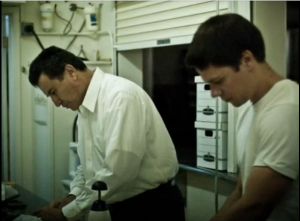Is it life?
I’ll get around to writing up my resolutions tonight, but just now I wanted to share a video I stumbled across last night. These are some comments by Planned Parenthood’s College Outreach Group. Their approach is utterly mind-boggling!
"We are travellers…not yet in our native land" – St. Augustine
I’ll get around to writing up my resolutions tonight, but just now I wanted to share a video I stumbled across last night. These are some comments by Planned Parenthood’s College Outreach Group. Their approach is utterly mind-boggling!
Tomorrow I’ll post my new resolutions for 2012, but I thought I’d first do a quick review of those from last year.
 1. Spend 30 minutes every day in Scripture: A lot of my time in 2011 was spent reading and studying Scripture, but I didn’t manage to achieve the quiet lectio divina style of reading for which I was aiming.
1. Spend 30 minutes every day in Scripture: A lot of my time in 2011 was spent reading and studying Scripture, but I didn’t manage to achieve the quiet lectio divina style of reading for which I was aiming.
Final Grade: C
2. More dancing: I did quite a bit here. I taught a good handful of times, went out social dancing a few times, attended Swing Diego and did a couple of months of West Coast Swing classes. However, I didn’t manage to settle into a regular pattern of dancing.
Final Grade: D
3. No more rushing: I think I really nailed this one. I had a busy year, but I didn’t overbook or frantically run about from appointment to appointment.
Final Grade: A
4. No chocolate: Did it. It was horrible. I love chocolate.
Final Grade: A
5. Get into the best shape of my life: At the beginning of the year I began keeping a closer eye on my diet. However, I didn’t really get into the way of regular exercise until towards the end of the year. I began running with John in the mornings but finally signed up for Bootcamp. Within two months of joining Bootcamp I lost 4% body fat and 8lbs. I go four or five times a week.
I’m not yet in the greatest shape of my life, but I’m well on my way to getting there. I’ve signed up for the Warrior Dash in March, by which time I hope this resolution will be achieved…
Final Grade: B
6. At least five minutes of guitar practice every day: I haven’t strictly fulfilled this, but I now to play very regularly and I think I’m much improved.
Final Grade: B
7. Keep proper track of finances: Much improved from the beginning of the year. I now have a financial adviser and I have my American finances in reasonable shape now. For a good while I kept a budget and checked my bank balances, but in the latter part of the year I’ve got out of the habit.
Final Grade: C
8. Get back to England for a couple of weeks: I went and it was wonderful
Final Grade: A
So, my final report card was:
D x1, C x2, B x2, A x3
Not bad! I’ll write about my new resolutions tomorrow
 We are still short of guys for Daughters of the King! Please contact me if you’d like to be involved:
We are still short of guys for Daughters of the King! Please contact me if you’d like to be involved:
 For all of you who are starting your New Year’s Resolutions today…
For all of you who are starting your New Year’s Resolutions today…
 Those of you who know me will know that I’m someone who is not a very “Christmas-y” sort of person…
Those of you who know me will know that I’m someone who is not a very “Christmas-y” sort of person…
Why?
Well, it’s probably partly because all my childhood recollections of school between September to January are dominated by memories of interminable carol rehearsals! I hate shopping at all times of the year, but especially during the Christmas rush. I hate picking up pine needles and I think fake trees are, well, fake. I don’t like the dark or cold which I usually associate with Christmas. I always look forward to the extraordinary liturgy of the Church at Easter, but at Christmas it is largely unchanged. And finally, nothing annoys me more than the saccharin-coated cheeriness which seems to be induced in people every December.
I’ve pretty much had this song on loop all day:
“Pain is a forest we all get lost in, between the branches hope can be so hard to see. And in the darkness we’ve all got questions, we’re all just trying to make sense out of suffering but You say I am blessed because of this so I choose to believe. As I carry this cross…”
From reading other people’s blogs, apparently in December bloggers share their favourite entries written over the past year. It’s certainly been a busy year for this blog, gaining both a a Patron Saint and a Theme Tune! Anyway, here are the category winners…
“Best Statue In Rome” | “Sacred Art” | “Bible Fail”
“Maccabees Style” | “What would Jesus do?”| “This is my King”
Fulton Sheen | Pope Benedict | Mark Hall
“There’s something about Mary” | “Purgatory” | “The curious case of celibacy”
“Introduction to Islam” | “Lectionary Resources” | “What’s the significance of IHS?”
…and now the top ten itself…